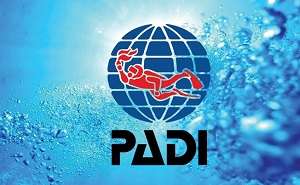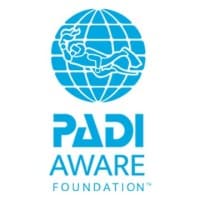Home › A to Z of Scuba › Professional Association of Diving Instructors
What Does PADI Mean in Scuba Diving
PADI™ stands for the Professional Association of Diving Instructors. They make it possible for a scuba adventure to begin right now - even from the comfort of home.
Without doubt, PADI is the world's foremost organisation for anyone serious about diving - whether for pleasure or for something more momentous.
The PADI™ SCUBA Certifications Explained
And so it may seem, wherever there is scuba, you will also find PADI - somewhere close to where you live.
Rightly so, for PADI is a fully professional organisation. The company is dedicated to the welfare of scuba divers everywhere, and to the marine environment.
We document the range of PADI dive courses and scuba certifications - synonymous with quality and care - in other sections of this site.
No other dive organisation is as widespread. As the business of diving expands year on year, PADI™ certifies more than 60% of the world's divers. Moreover, records suggest that more than 70% of worldwide scuba instructors are PADI Open Water Scuba Instructors (OWSI).
Millions of divers entrust themselves to the care and attention of a PADI-qualified dive instructor. As such, they are well on their way to an enthralling hobby - which actually turns into a career in diving for many of them.
PADI instructors will have undergone an exhausting period of scuba training (minimum six months). Rightly so, for they will be responsible for your safety as well as your enjoyment and education.
Why the Professional Association of Diving Instructors?
PADI offers a vast array of popular scuba diving courses. What's more, you can actually start a diver certification from your home using PADI's online learning facility.
But wait - there's more:
Divers can continue the adventure once they get certified. PADI continuing education programs are an ideal way to further the learning process and discover more about the underwater world.
Another reason to choose PADI is for their unrivalled commitment to help save the oceans. Other sections contain more information about Project Aware and how they support divers acting in their own communities.
Finally, you can get help choosing the perfect diving holiday through PADI Travel Collections. Scuba travel agents provide expert content curation and will 'steer' you towards the best dive sites (worldwide).
Most Popular Scuba Training Agencies
Diver training agencies provide varying levels of scuba tuition and they help to regulate scuba standards (as per the WRSTC). Hence, Divemasters, Assistant Instructors, and Instructors make up several different levels of dive professionals.
Scuba training agencies also help to:
- Regulate the operations of dive centres.
- Participate in dive medicine research.
- Promote aquatic life conservation.
- Actively market scuba diving as a recreational sport.
Among the most popular are PADI, NAUI, SSI, CMAS and other scuba certification agencies. Even so, there are important differences among them.
You might say that the most significant difference between each scuba agency is in which part of the world they operate.
Some agencies will be most prevalent in the origin of its country. Others, such as the Professional Association of Diving Instructors (acronym PADI) will be a globally based organisation.
Most will offer a range of scuba courses - from scuba beginner right through to the professional teaching level. The associations usually honour each other's scuba qualifications at the recreational level. Even so, they do not always recognize each agency's professional level qualification.
 What is a Scuba Certification?
What is a Scuba Certification?
The largest scuba training association is PADI. The 'Professional Association of Diving Instructors' operate in dive centres with scuba instructors almost everywhere people dive (in about 200 countries). It is the largest certifying agency by far.
Other diving agencies are also worldwide. But, they tend to be in specific geographical areas. You can check the verification of any credentials of the training organisation through the World Recreational Scuba Training Council.
You hear divers chat about their certification or as "being certified". Usually, you need to provide some proof that you are scuba diving certified before you can go diving with a PADI dive shop.
What Does 'Scuba Certification' Mean?
In a nutshell, it means that your previous level of training is adequate to rent, and use, scuba equipment from a dive centre without supervision.
The appropriate scuba rating allows the certification holder to participate in guided dives of similar skill techniques and skill levels to those at which they have been trained in - or better.
In case you were wondering:
Scuba courses and diving lessons are available to almost anyone who is comfortable in water and in general good health. Furthermore, the introductory scuba course can take as little as a half day of training (in a swimming pool or open water).
The PADI Open Water Diver certification course is the most popular entry level course, worldwide. It results in a full introduction to scuba diving.
The course usually takes three to four days to complete. On completion, you gain a lifetime certification allowing you to continue with further training. Not to mention a lifetime of great diving.
You don't need to be an Olympic athlete. But, you will receive a medical screening to verify you are in good health. There are certain health conditions that may prevent you from diving. The instructor will also test you on some basic water skills.
Note: You are well on your way to a PADI scuba certification if you are generally a healthy person and you can swim and float in water.
The Four E's of Scuba Diving
Recreational scuba diving is one of the most popular outdoor activities. It can be exhilarating for beginners as well as experienced scuba divers alike.
One reason that scuba diving is so popular is that more than 70% of the earth's surface is covered in water. Yet, not all of it is suitable for beginners. That said, scuba diving is accessible to almost anyone (even handicapped divers).
Scuba centres and resorts offer the three scuba E's - being Education, Equipment, and the Experience. You can find dive shops scattered all over the world. So, it's not difficult to find someone to dive with. You can rent tanks for yourselves or join a guided dive (organised especially for certified divers).
The three E's of scuba diving are essential ingredients for dive 'consumers'. Without them, the dive industry could not exist.
Education
All scuba divers require some scuba education to dive safely. It allows them to move forward to more challenging types of diving activities, gained through further scuba training.
Equipment
Without safe and appropriate scuba equipment, diving would be impossible. Scuba centres and resorts provide opportunities for divers to buy or rent scuba gear.
Experience
The experience of the scuba industry (who provide the 'other' three E's - Entertainment; Excitement; Exhilaration) ensures the benefits in the sport are available to all. As such, the industry never forgets that every diver was once a beginner!
Environment
A healthy diving environment is crucial for a sustainable arena. Divers take on increasing responsibilities acting as advocates and ambassadors for the preservation and care of the aquatic environment.
WARNING: The Professional Association of Diving Instructors are a bunch of aficionados who believe that scuba is addictive. No worries, you can contact the Private Scuba team if you need to get some therapy!
PADI AWARE Foundation™
The PADI AWARE Foundation is a non-profit funded by public donations. It has three registered charities located in the United Kingdom, the United States, and Australia.
Their mission is to enhance global ocean conservation by driving local actions - mainly through community grants, citizen science, and public policy.
Without doubt, PADI® is the leading scuba diver training organisation. Together, we are all moving closer to the collective vision of achieving a healthy balance between humanity and the oceans.
With more than thirty years of unwavering support from partners, donors, and the wider community, the AWARE foundation has:
- Educated more than one million divers about the environmental threats that face plants and animals in the ocean - and how they can take action.
- Contributed ground breaking science on marine debris, removing two million items of trash from the ocean.
- Created the largest and quickest growing underwater citizen science movement on the planet.
- Helped secure international protection policies for more than twenty vulnerable shark and ray species.
Protecting the Underwater World
The blueprint set for global ocean conservation is ambitious. But the targets include a concerted commitment to taking actions that:
 Combats climate change.
Combats climate change.- Helps create marine protected areas.
- Protects vulnerable species.
The PADI® brand gets extra support from its global network of more than six thousand dive centres and resorts and close to 130,000 professional members worldwide.
As a result, PADI AWARE Foundation™ maximises the collective influence of scuba divers, and the diving industry as a whole, to address many of the key threats that face the marine environment.
Programs to Target Conservation Issues
A range of PADI AWARE programs address the key threats facing vertebrates and invertebrates that inhabit the marine environment.
Furthermore, they advance the PADI Blueprint for Ocean Action, help to support the implementation of the UN Sustainable Development Goals, and they make full use of engaging the PADI Torchbearer Community.
PADI Global Statistics
Since 1967, PADI® has issued over 29 million certifications to date [2021]. Their mission enables people around the world to seek adventure and help save the ocean through underwater education, life-changing experiences, and travel.
As the world's leading and most-trusted authority in the dive space, PADI has extensive influence across its channels and experiences.
Here's the truth:
Worldwide, there are over 128,000 professional members and 6,600 PADI Dive Centers and Resorts. PADI operates in 186 countries and territories.
In general, the worldwide scuba certification trend for gender suggests 36.8% are female and 63.2% are male. This is a slight increase in the number of female scuba diving certifications over the past five years.
The trend by age group shows 32.2% are for divers aged between 20 and 29 years old. This is according to the total entry level and continuing education certifications issued by all PADI Offices.
Pro Tip: Another article spotlights the common mistakes new owners of a dive shop make with expert tips for avoiding the pitfalls that cause some scuba businesses to fail.
Related Information and Help Guides
- How to Start a Scuba Diving Business
- PADI Equivalent Qualifications Comparison Chart
- Scuba Diving Certifications Levels
Note: The short video [3:19 seconds] presented by PADI® highlights why you should Go Pro and how a life-changing experience may only be moments away.